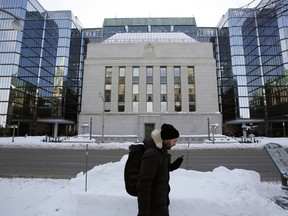Here are the 5 key take-aways from deputy governor’s speech on how immigration is impacting the economy
Article content
The recent influx of newcomers to Canada has not meaningfully added to overall inflation, though it has put pressure on the country’s housing market, Bank of Canada deputy governor Toni Gravelle said in a speech Dec. 7. Gravelle made the remarks in an address to the Windsor-Essex Regional Chamber of Commerce a day after the central bank decided against hiking interest rates, keeping its benchmark rate at five per cent. Here are five key take-aways from Gravelle’s speech, which focused on the impact high immigration rates have been having on the economy.
Advertisement 2
Article content
1. The economy is cooling, but we’re not there yet
Article content
The bank’s efforts to reduce inflation appear to be working. Economic growth and consumer spending are down, while unemployment is up, Gravelle said. These are good signs, because they mean the economy is slowing down and the prices of goods and services is decreasing. Hiking rates is a delicate balance. “We don’t want to slow the economy too much, but we also don’t want Canadians to continue living with the pain of high inflation,” Gravelle said. While progress is being made, we’re not out of the woods yet, he said. Food inflation has come down, but remains high. “While we saw some welcome improvement in inflation measures in October, we must remember it’s just one month. We need to see further progress,” he said.
2. Newcomers aren’t boosting inflation
As always, Canada’s population is growing, driven primarily by immigration, said Gravelle, noting that one million newcomers had arrived over the past four quarters alone. Contrary to popular belief, however, he said immigration overall isn’t putting upward pressure on inflation. Gravelle noted that while some categories of newcomers, such as foreign students, might be spending more and working less, thus driving inflation, other categories, such as migrant workers, were having an offsetting effect, contributing to economic growth and productivity despite spending little. Overall, he said, immigration is helping to ease the tight labour market, alleviating shortages and increasing productivity by two per cent to three per cent.
Article content
Advertisement 3
Article content
3. Canada’s labour force is aging, but newcomers are giving us a leg up on the U.S. and U.K.
One in five Canadian adults is on the verge of retirement, which will “hold back” workforce growth, Gravelle said. Canada’s not alone in this; in most advanced economies, the baby boomer generation is poised to retire. “But Canada is doing better than others, thanks to immigration,” Gravelle said. Immigration has enabled Canada’s working-age population to grow significantly, outpacing the United States, Europe and the United Kingdom. Many newcomers remain “underemployed,” though, he said. “We’ve all heard stories of foreign-trained doctors driving taxis or working at daycares because they face challenges getting their credentials recognized,” he said.
4. The housing crisis persists
New home construction is up for the first time since mid-2022, but it’s still not enough to mitigate Canada’s housing crisis, Gravelle said. Immigration is exacerbating the issue, putting upward pressure on rent prices in the short-term because new immigrants tend to rent when they first arrive. Canada’s housing crisis stems from a few key structural issues, including zoning restrictions, the difficulty in acquiring permits in many cities and a shortage of construction workers. The U.S., on the other hand, isn’t experiencing the same crisis, because it’s easier to build there and the country tends to take in large share of immigrants trained in construction, which helps home building.
Advertisement 4
Article content
Related Stories
5. Challenges lie ahead
Housing remains a problem, and in order to solve it, “we need all levels of government to work together on a variety of policies,” Gravelle said. For one, the government needs to reduce barriers to building, he said. If we can get the housing situation under control, it’ll be well worth it, because it will allow us to “fully realize the long-term economic benefits of our recent population growth,” Gravelle said. In the meantime, the bank isn’t afraid to raise rates if the economy shows signs of heating up again, he added. “Given the risks to the inflation outlook, we remain prepared to increase the policy rate further if needed.”
• Email: mcoulton@postmedia.com
Bookmark our website and support our journalism: Don’t miss the business news you need to know — add financialpost.com to your bookmarks and sign up for our newsletters here.
Article content
Bank of Canada: Immigration hit housing market, not fuelling inflation
2023-12-07 19:42:55




